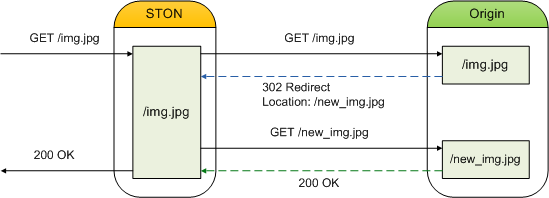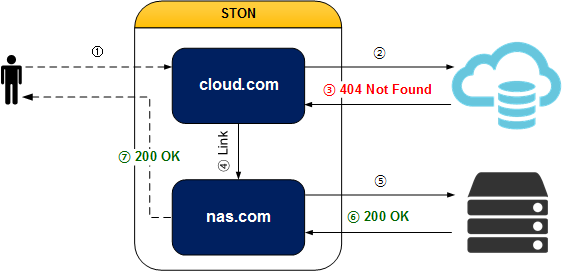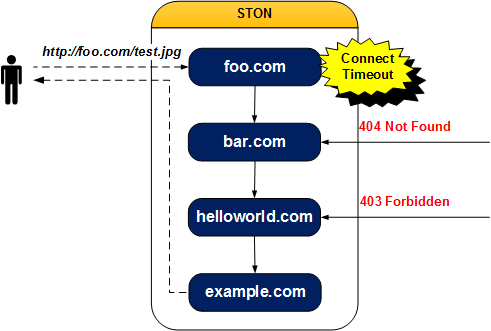Chapter 14. Advanced Virtual Host Configuration¶
This chapter will discuss advanced topics related to virtual host configuration.
Each virtual host is supposed to match its origin. (a domain or an IP) But sometimes a virtual host has to be connected to others, or the other way round. Depending on functionalities, Client Statistics / Access Log policies might be different.
URL Preprocessing¶
Regular expressions are used to modify the requested URLs. If URL preprocessing is defined, all client requests (HTTP or File I/O) must pass through the URL Rewriter.

The request can only reach the virtual host by passing through the URL Rewriter.
If an approaching Host name is modified by the URL Rewriter, then it will consider it as if the Host header was modified by the client’s HTTP request. URL preprocessing is configured in the virtual host settings (vhosts.xml). While most settings are under the virtual host, URL preprocessing can change the name of the Host requested by the client, so the settings must be on the same level as the virtual host.
# vhosts.xml
<Vhosts>
<Vhost ...> ... </Vhost>
<Vhost ...> ... </Vhost>
<URLRewrite ...> ... </URLRewrite>
<URLRewrite ...> ... </URLRewrite>
</Vhosts>
Multiple configurations are allowed, and the regular expressions will be checked in order.
# vhosts.xml - <Vhosts>
<URLRewrite AccessLog="Replace">
<Pattern>www.example.com/([^/]+)/(.*)</Pattern>
<Replace>#1.example.com/#2</Replace>
</URLRewrite>
<URLRewrite>Configures URL preprocessing.
AccessLog (default: Replace)Configures URLs that will be recorded in the Access log.Replacerecords URLs after processing (/logo.jpg), whilePatternrecords URLs after processing (/baseball/logo.jpg).<Pattern>Configures the patterns to be matched. A single pattern is expressed with parentheses ().<Replace>Configures the conversion format. Patterns that match can be used with expressions like #1 and #2. #0 stands for the entire requested URL. A maximum of nine patterns (up to #9) can be configured.
Throughput is provided by Chapter 10. Monitoring & Statistics and can also be checked via Successful URL Preprocessing. URL preprocessing can work alongside Trimming and MP4 HLS to simplify expressions further.
# vhosts.xml - <Vhosts>
<URLRewrite>
<Pattern>example.com/([^/]+)/(.*)</Pattern>
<Replace>example.com/#1.php?id=#2</Replace>
</URLRewrite>
// Pattern : example.com/releasenotes/1.3.4
// Replace : example.com/releasenotes.php?id=1.3.4
<URLRewrite>
<Pattern>example.com/download/(.*)</Pattern>
<Replace>download.example.com/#1</Replace>
</URLRewrite>
// Pattern : example.com/download/1.3.4
// Replace : download.example.com/1.3.4
<URLRewrite>
<Pattern>example.com/img/(.*\.(jpg|png).*)</Pattern>
<Replace>example.com/#1/STON/composite/watermark1</Replace>
</URLRewrite>
// Pattern : example.com/img/image.jpg?date=20140326
// Replace : example.com/image.jpg?date=20140326/STON/composite/watermark1
<URLRewrite>
<Pattern>example.com/preview/(.*)\.(mp3|mp4|m4a)$</Pattern>
<Replace><![CDATA[example.com/#1.#2?&end=30&boost=10&bandwidth=2000&ratio=100]]></Replace>
</URLRewrite>
// Pattern : example.com/preview/audio.m4a
// Replace : example.com/audio.m4a?end=30&boost=10&bandwidth=2000&ratio=100
<URLRewrite>
<Pattern>example.com/(.*)\.mp4\.m3u8$</Pattern>
<Replace>example.com/#1.mp4/mp4hls/index.m3u8</Replace>
</URLRewrite>
// Pattern : example.com/video.mp4.m3u8
// Replace : example.com/video.mp4/mp4hls/index.m3u8
<URLRewrite>
<Pattern>example.com/(.*)_(.*)_(.*)</Pattern>
<Replace>example.com/#0/#1/#2/#3</Replace>
</URLRewrite>
// Pattern : example.com/video.mp4_10_20
// Replace : example.com/example.com/video.mp4_10_20/video.mp4/10/20
If one of the five special XML characters are used, then the pattern must be surrounded with a <![CDATA[ … ]]> tag. If configured using Chapter 13. WM (Web Management), all patterns are processed as CDATA.
Facade Virtual Host¶
Because <Alias> is just a nickname for the virtual host, it will not provide separate statistics and logs. If you want to use the same virtual host but obtain different Client Statistics and Access Log depending on the domain, a Facade Virtual Host can be configured.
# vhosts.xml - <Vhosts>
<Vhost Name="example.com">
...
</Vhost>
<Vhost Name="another.com" Status="facade:example.com">
...
</Vhost>
This can be done by inputting facade: + virtual host into the Status property. In the previous example, the Client Statistics and Access Log will be recorded for clients that request another.com, not example.com.
Sub-Path¶
A single virtual host can have different sub-paths. These sub-paths can be configured to be handled by separate virtual hosts.
# vhosts.xml - <Vhosts>
<Vhost Name="sports.com">
<Sub Status="Active">
<Path Vhost="baseball.com">/baseball/<Path>
<Path Vhost="football.com">/football/<Path>
<Path Vhost="photo.com">/*.jpg<Path>
</Sub>
</Vhost>
<Vhost Name="baseball.com" />
<Vhost Name="football.com" />
<Vhost Name="photo.com" />
If the page path or pattern matches the
<Sub>input, then it will be sent to the corresponding virtual host. If they do not match, then the page will be handled by the current virtual host.Status (default: Active)Sub-paths are ignored when inactive.<Path>If the URI requested by the client and the path match, the request will be sent toVhost. Only paths or patterns are allowed.<Path Vhost="baseball.com">baseball<Path> <Path Vhost="photo.com">*.jpg<Path>
If input as above, they will be parsed as /baseball/ and /*.jpg, respectively.
For example, if the client requests the following, the request will be sent to the football.com virtual host.
GET /football/rank.html HTTP/1.1
Host: sports.com
Redirect Tracing¶
When the origin server responds with the Redirect responses (301, 302, 303, 307), the location header is tracked to request the content.

The redirection is hidden from the client.
# server.xml - <Server><VHostDefault><OriginOptions>
# vhosts.xml - <Vhosts><Vhost><OriginOptions>
<RedirectionTrace>OFF</RedirectionTrace>
<RedirectionTrace>OFF (default)Saved as 3xx responses.ONDownloads content from the address specified in the location header.
Works only if matched to the format or with a valid Location header. Traced only once to prevent infinite redirects.
Virtual Host Link¶
Even if the content is distributed across multiple origins, the service is still operable as if the content were integrated using virtual host links. It is particularly useful in environments where content is scattered due to on-premise to cloud storage migration, storage capacity, and cost.

Content missing from cloud.com is delivered by nas.com.
# vhosts.xml - <Vhosts><Vhost>
<VhostLink Condition="...">...</VhostLink>
<VhostLink>The virtual host name to delegate requests to. If the original response to the content satisfies `` Condition``, the request is delegated to the specified virtual host. Only one can be set.ConditionHTTP response code / pattern (1xx, 2xx, 3xx, 4xx, 5xx), fail (If failed to cache from source)
Even if the client request is delegated to another virtual host, the: ref: monitoring_stats_vhost_client and: ref:` admin-log-access` are recorded in the virtual host accessed by the client.
Note
Please note that if the virtual hosts’ configurations in the link are different from each other, it may operate in unintentional ways.
If the virtual host link is concatenated with A (simple caching) -> B (image compression) Images processed in A are not compressed, but images processed in B are compressed.
For example, if you are moving content from nas.com to cloud.com, you can only send requests to nas.com for content not on cloud.com (= 404 Not Found). In the following cases: ref: monitoring_stats_vhost_client and: ref:` admin-log-access` are recorded on cloud.com, even if the request is handled by nas.com.
# vhosts.xml - <Vhosts>
// Content not on cloud.com (= 404 Not Found) will be served on nas.com.
<Vhost Name="cloud.com">
<VhostLink Condition="404">nas.com</VhostLink>
</Vhost>
<Vhost Name="nas.com">
</Vhost>
The vhostlink field of: ref: admin-log-access will tell you which virtual host the client request was processed on. “-” means the request is not linked, and “nas.com” means that the request has been linked and processed at nas.com.
#Fields: date time s-ip cs-method cs-uri-stem …(…)… vhostlink
2016.11.24 16:52:24 220.134.10.5 GET /web/h.gif …(…)… -
2016.11.24 16:52:26 220.134.10.5 GET /favicon.ico …(…)… nas.com
If the link has occurred multiple times, all virtual hosts linked with “+” delimiters are specified. In this case, the last virtual host is the virtual host that processed the last request.
You can link multiple virtual hosts to different conditions as follows:
# vhosts.xml - <Vhosts>
// When the origin server responds with 5xx or fails to cache (= fail), it delegates the request to bar.com.
<Vhost Name="foo.com">
<VhostLink Condition="5xx,fail">bar.com</VhostLink>
</Vhost>
// Delegates the request to helloworld.com when the origin server responds with 4xx.
<Vhost Name="bar.com">
<VhostLink Condition="4xx">helloworld.com</VhostLink>
</Vhost>
// When the origin server responds with 403, 404, or 5xx, it delegates the request to example.com.
<Vhost Name="helloworld.com">
<VhostLink Condition="403,404,5xx">example.com</VhostLink>
</Vhost>
// Does not delegate any more.
<Vhost Name="example.com">
</Vhost>

It might look akward but not impossible.
In the above example, the: ref: admin-log-access of foo.com looks like this:
#Fields: date time s-ip cs-method cs-uri-stem …(…)… vhostlink
2016.11.24 16:52:24 220.134.10.5 GET /test.jpg …(…)… bar.com+helloworld.com+example.com
In the following cases, the link is immediately terminated.
- If the target virtual host does not exist (foo.com ->?)
- If you specified yourself as the destination virtual host (foo.com -> foo.com)
- If a recursive link occurs (foo.com -> bar.com -> foo.com)